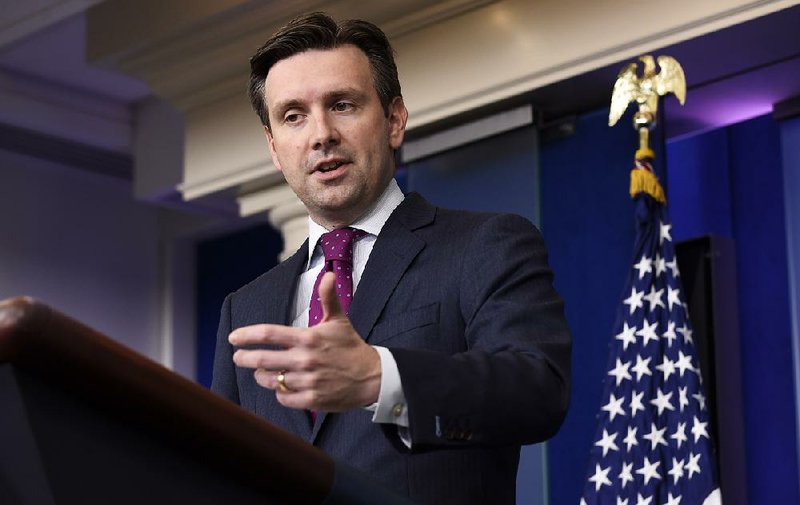WASHINGTON -- President Barack Obama and Israeli Prime Minister Benjamin Netanyahu made dueling appeals to the American-Jewish community Tuesday as they sought to rally support for their opposing positions on the Iran nuclear deal.
Netanyahu made his case in a live webcast with more than 10,000 participants, according to the U.S. Jewish groups that organized the event. The prime minister railed against the agreement to curb Iran's nuclear program in exchange for billions of dollars in sanctions relief, calling it a "bad deal" that leaves Tehran on the brink of a bomb.
"The nuclear deal with Iran doesn't block Iran's path to the bomb," he said. "It actually paves Iran's path to the bomb.
"This is the time to oppose this dangerous deal. The days when the Jewish people could not speak out for themselves are over."
Obama met privately for more than two hours with Jewish leaders at the White House, making a detailed case for the nuclear accord and urging opponents -- including some in the room -- to stick to the facts in making their own arguments, according to participants. He singled out the tens of millions of dollars being spent by critics, most notably the pro-Israel group American Israel Public Affairs Committee.
Participants in the meeting said attendees who oppose the deal said they are concerned about being painted by the president as eager for war. The participants said that although Obama appeared sympathetic to their concerns, he continued to argue that if Congress rejects the agreement, he or the next president would face a decision on taking military action to prevent Iran from obtaining a nuclear weapon.
Netanyahu also disputed Obama's assertion that opponents of the diplomatic deal favor war. He called that assertion "utterly false," saying Israel wants peace, not war.
The direct appeals from Obama and Netanyahu come amid an intense lobbying campaign on Capitol Hill, where lawmakers plan to vote on the nuclear deal next month.
The White House is preparing for the likelihood that lawmakers will vote against the deal and is focusing its lobbying efforts on getting enough Democrats to sustain a veto. Only one chamber of Congress is needed to sustain a veto.
Obama spokesman Josh Earnest said Monday that the White House is confident it can sustain a veto "at least in the House."
The president got a boost in the Senate on Tuesday with Sens. Barbara Boxer of California, Tim Kaine of Virginia and Bill Nelson of Florida announcing their support for the deal.
Boxer announced her position after a meeting between Democrats and ambassadors representing the countries that signed the agreement.
"It was very important to hear from them that they believed if we walked away, it would play right into the hands of the hard-liners in Iran, Iran would build a nuclear weapon, they'd have lots of money from everybody else but America, and it'd be a very dangerous situation," she said.
Nelson echoed Boxer's comments in a speech on the Senate floor, warning that if Congress were to reject the agreement, "there's no question in this senator's mind that the sanctions will start to erode, and they may collapse altogether."
Kaine, an emerging foreign policy voice for Democrats in the Senate, said in a separate floor speech that the deal was "far preferable to any other alternative, including war."
The administration lost the backing of three prominent Jewish Democrats -- New York Reps. Steve Israel and Nita Lowey and Florida Rep. Ted Deutch.
One of the Democrats being closely watched is New York Sen. Charles Schumer, who declined to say Tuesday whether he was any closer to making his decision on whether to support the Iran agreement.
"I've had several more briefings and discussions, and I'm getting a lot of questions answered," he told reporters, adding that he won't let "party, pressure or politics" influence his decision.
Senate Majority Leader Mitch McConnell, R-Ky., said Tuesday that when the Senate returns to consider the measure in September, it should "actually have a debate that rises to the occasion that this seems to require."
He said he would seek agreement for enough time for all 100 senators to attend and speak during a formal debate in September, something the chamber rarely does.
Other undecided lawmakers such as Sen. Richard Blumenthal, D-Conn., said they will continue to study the agreement during the congressional recess and solicit the input of their constituents.
Information for this article was contributed by Julie Pace of The Associated Press and by Justin Sink, Billy House and Kathleen Miller of Bloomberg News.
A Section on 08/05/2015
